Zoë Marriott's Blog, page 35
September 20, 2012
FROSTFIRE IN GERMANY
Hello and Happy Thursday!
I'm feeling a little tense today because tomorrow I'm off to Sheffield Highschool, where I'll be doing an event with about a hundred young ladies. For some reason school visits make me more nervous than any other kind of event, even the swishy posh ones where I'm supposed to act like a grown-up. My writing group think maybe it's because I get flashbacks to my own fairly horrific school-age experiences. I wonder if it's because these guys - young people - are my actual audience and the ones I'm dedicated to reaching and pleasing. In either case, I have the collywobbles. Wish me luck, Dear Readers!
In the meantime, I have some news to share - and you can probably guess what it is from the not-terribly-subtle post title. FrostFire has sold its first foreign right, to the German market. Which is exciting not only because, you know - my book in another language, a new interpretation of the cover art - but also because the German publisher is Carlsen Verlag .
That's... Carlsen Verlag, German publisher of Kristin Cashore, Melissa Marr, Scott Westerfield, Leigh Bardugo, Stephenie Meyer and a certain J.K. Rowling.
*Pause while Zolah muffles her squeeing in a pillow*
Ahem. And apparently they're intending to ramp up the focus on their selection of translated titles from Autumn 2013, and were looking for a special lead title to launch the new programme. Guess what that title is?
*More muffled squeeing*
So FrostFire gets to be the lead translated title from this amazing publisher in Autumn next year. I'm thrilled, and can't wait to see how the German version looks. Yay, Germany!
I'm feeling a little tense today because tomorrow I'm off to Sheffield Highschool, where I'll be doing an event with about a hundred young ladies. For some reason school visits make me more nervous than any other kind of event, even the swishy posh ones where I'm supposed to act like a grown-up. My writing group think maybe it's because I get flashbacks to my own fairly horrific school-age experiences. I wonder if it's because these guys - young people - are my actual audience and the ones I'm dedicated to reaching and pleasing. In either case, I have the collywobbles. Wish me luck, Dear Readers!
In the meantime, I have some news to share - and you can probably guess what it is from the not-terribly-subtle post title. FrostFire has sold its first foreign right, to the German market. Which is exciting not only because, you know - my book in another language, a new interpretation of the cover art - but also because the German publisher is Carlsen Verlag .
That's... Carlsen Verlag, German publisher of Kristin Cashore, Melissa Marr, Scott Westerfield, Leigh Bardugo, Stephenie Meyer and a certain J.K. Rowling.
*Pause while Zolah muffles her squeeing in a pillow*
Ahem. And apparently they're intending to ramp up the focus on their selection of translated titles from Autumn 2013, and were looking for a special lead title to launch the new programme. Guess what that title is?
*More muffled squeeing*
So FrostFire gets to be the lead translated title from this amazing publisher in Autumn next year. I'm thrilled, and can't wait to see how the German version looks. Yay, Germany!
Published on September 20, 2012 01:48
September 18, 2012
DIVERSITY Vs. CULTURAL APPROPRIATION
Hello, hello, hello my lovelies! Blog hiatus is over - I hope YOU all had a lovely week? - and sadly I didn't get much work done at all, for various tedious reasons with which I have no intention of boring you.
However, what I did get done was the first draft of this blog post, because, Dear Readers, last week I read an interview with the writer Jay Kristoff - author of the novel STORMDANCER - and had a very strong reaction to it. And as you know, when Zolah has a strong reaction to something, she likes to rant about it here. I've actually been holding myself back from posting this for several days because I wanted to give myself time to cool down and look at the issue rationally (ha ha. Yeah. Well, I tried).
Unless you've been living under a rock, I'm sure you've seen some of the buzz for this novel. It's a huge book. Everyone is talking about it. Now I am going to talk about it too, but not in the way that the majority of other people are, unfortunately.
First off I should say I haven't read the book. Nope. Not a single word of it. But I was hugely excited when the synopsis hit the internet, just like everyone else:
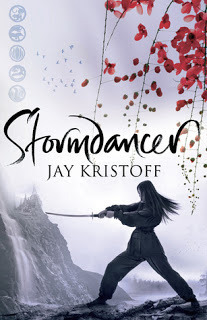
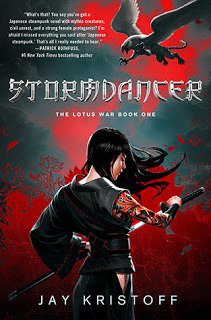
They look SO GOOD, right? I even put the US one (that's the illustrated one) on my board for The Trilogy on Pinterest! And then it all went horribly wrong because I read this .
Just in case you don't want to click away or the interview disappears for whatever reason, I'll reprint the part that I'm concerned with - the part that made me stop like someone had smacked me right in the face with a cast-iron skillet here:
Before I go on, I want to say that this blog article isn't an attack on Mr Kristoff. As I said earlier, I haven't read his book. He could have been misquoted, misinterpreted or simply being funny rather than serious in this interview. I don't know him in any way at all, let alone personally. I'm not writing this to hurt him or his book sales - and in fact, from the amount of advance buzz his book is getting, I'm sure that it's going to be a huge success regardless of what little-midlist-me might think.
However, by answering these questions in this way, he has made it impossible for me to ever read STORMDANCER and that, quite frankly, p*sses me off. Why do these remarks affect me this way? Because they raise issues of diversity - that wonderful thing that I love to see, which I attempt to write, which I want to encourage with every fibre of my being - and cultural appropriation, which is not, in any way, shape or form, OK.
What's the difference? Well, I talk diversity here and here but basically when you write diversely you attempt to include strong, realistic portrayals of many different kinds of people, most especially those who are traditionally excluded, marginalised, silenced or stereotyped by the mainstream media of the West (which, as we know, really only likes to see white, straight, able-bodied, cisgendered people, and particularly men, in juicy roles). This often means writing about other religions, other ethnicities, and other cultures than your own. The whole point of attempting to be a diverse writer would be to write about those cultures with respect, attempting to show them as fully realised, complex and valid.
Cultural appropriation on the other hand, is where a privileged author uses the trappings of another culture as an 'exotic' background and its people as a quaint novelty, mere window dressing for some story he wants to tell, without having any respect for or interest in that culture, or in representing it truthfully and accurately.
Diversity is a way of unfolding our awareness of the world, of exploring our differences and acknowleging that all of humanity has a story. Diversity is about expanding your mind. It's about learning.
Cultural appropriation is about reinforcing stereotypes because they give you a quick and easy way to add colour or excitement to your story. Cultural appropriation is about being so unconsciously certain that your way of life is the only real or important or valid one that it doesn't occur to you that you might not be perfectly qualified to use an entirely different culture as a backdrop for your story without doing any real research about it. It's about putting assumptions, stereotypes and inaccurate information on the page and actually being proud of it because you think the mere fact that you stooped to visit another culture with your writing ought to be an honour for that culture. And if you misrepresented something, no one who matters (ie. no one from your culture) will either notice or care.
Diversity is casting a character in a film with a black or Asian or Indian or Native American actor just because they're a bloody good actor and there's no reason the character should be white.
Cultural appropriation is casting a white person in a role that should be filled by a black, Asian, Indian or Native American actor and then saying that it's OK because the make-up department put bronzer and a wig on them.
I'm a fantasy writer. I know full-well that sometimes the setting must serve the story. Shadows on the Moon is set in Tsuki no Hikari no Kuni rather than the real, historical Japan because I knew I couldn't tell the story that I wanted to tell in any version of real Japan. But that didn't stop me from exploring Japanese culture to the fullest of my ability, even if two thirds of the stuff I found out never made it into the book at all. That didn't stop me from attempting to show all the aspects of Japanese culture that borrowed as much respect within my story as possible. That didn't stop me from being *interested* in the culture from which I was taking inspiration.
I didn't do a perfect job. I made mistakes. Some have already been pointed out to me and possibly in the wake of this post people will turn up and tell me about even more. Messing up is part of attempting to do that scary diverse writing thing and I've accepted that, and the butt-kickings that may deservedly bruise my behind as a result. The point is I CARED. I tried. I did my best.
Setting your book in a culture you know very little about, then proudly telling the world that your only research was random anime and manga you'd seen over the years, Wikipedia, and some guy you know (who, from the sound of it, isn't even actually Japanese)? That doesn't display interest, or caring, or respect for that culture, does it? It's so breathtakingly wrong that I'mkind of shocked, in this day and age, that anyone could speak like that without pausing halfway through and realising: I sound like a complete *sshat.
Fantasy is shamefully guilty of a European focus, it's true. But if your answer to this is to base your book's fictional country on a different culture in which you have less interest than a kid doing a book report for school? That doesn't mean you've broken through the shameful focus on Europe. It means you've just randomly used someone else's culture to try and make yourself look somehow better, more broadminded, more liberal, than all those Europe-focused writers without actually BEING better than them. It means you've just added to the already extensive history of exoticised, novelty-value portrayals of non-Western cultures. Which is an *sshat move, man.
It also leads to problems like you thinking that 'sama' in Japanese is the exact same thing as the word 'Sir' in English and using it accordingly. Which, as anyone who has any kind of interest in Japan would know, is a complete misunderstanding not only of that word, but of the usage of the honourific system of address. As does believing that 'hai!' is the same as 'yes!' (hint: it's not, and it makes your characters sound very odd indeed if they're constantly using it that way). Also, if you're going to have the word 'Japan' right there on your front over it might be a good idea not to use Pandas (native to China - an entirely different country, even if it's filled with more of those Asian people!) as a feature of the wildlife in your story. These are just three of the problems which other people have noticed in the book, and which even an elementary level of research would have eliminated. I mean, I'd expect anyone who'd read a couple of volumes of manga to have picked those issues up.
What's even more baffling is that there's apparently a glossary explaining, among other things, the correct meaning and usage of both these words at the back of the book, so someone at the publisher did do the research and did know all this - but either it wasn't thought worthwhile to edit the book to make it more credible, or the writer refused to consider that the way he wrote it in the first draft wasn't fine.
In case anyone needs this confirming? As Westerners, whatever we think we know, or what - God help us - 'everyone knows' about any culture other than our own? Is not a good enough basis on which to build a respectful portrait of that culture. Nor is a passing interest in films produced by that culture, or having known a girl from that culture once, or having read a book about it in school. The West has spent its entire history marginalising, exoticising, exploiting, silencing and generally stomping all over every culture that wasn't its own and that means we've only seen the bowdlerised Western version of anything that isn't the West. Intuition doesn't cut it. The idea that 'we're all the same deep inside!' doesn't cut it. It's just not good enough.
Show some respect and do your frakking research.
No, you still won't get it perfect, most probably. But at least you won't have treated other people's cultures as if they were crispy bacon flavoured topping you sprinkle on your salad to make all the green leafy bits look a bit more appealing.
In order to back up my outrage over this issue, let's have some posts from other people who tackle cultural appropriation with far more eloquence than I could hope to. First, let's have this stingingly brilliant post from Wistfully Linda in which she talks about Green Eyed Asian Love Interests.
And now a review from Cyna on You Kill Me - warning, adult language on this one! But also a really detailed examination of the various problems in the text, including the ones mentioned above and mmmmmaaaaany others.
Finally, this well-reasoned post from author Ellen Oh, who talks about The Importance of Proper Research.
In closing, Dear Readers: diversity is a very good thing and I hope you will strive to achieve it in your lives and your writing. Keep at it. But remember that diversity always comes from a place of humble respect and willingness to learn. If you find yourself writing about people and cultures who are entirely different from you and yours - about whose unique experiences you actually know nothing, remember! - with the smug attitude that Wikipedia has all the information you could possibly need? You're writing like an *sshat.
You are not *sshats, my loves. You are better than that. We all should be.
However, what I did get done was the first draft of this blog post, because, Dear Readers, last week I read an interview with the writer Jay Kristoff - author of the novel STORMDANCER - and had a very strong reaction to it. And as you know, when Zolah has a strong reaction to something, she likes to rant about it here. I've actually been holding myself back from posting this for several days because I wanted to give myself time to cool down and look at the issue rationally (ha ha. Yeah. Well, I tried).
Unless you've been living under a rock, I'm sure you've seen some of the buzz for this novel. It's a huge book. Everyone is talking about it. Now I am going to talk about it too, but not in the way that the majority of other people are, unfortunately.
First off I should say I haven't read the book. Nope. Not a single word of it. But I was hugely excited when the synopsis hit the internet, just like everyone else:
Griffins are supposed to be extinct. So when Yukiko and her warrior father Masaru are sent to capture one for the Shogun, they fear that their lives are over. Everyone knows what happens to those who fail him, no matter how hopeless the task.When I saw the covers, that just shot my excitement up to a whole new level:
But the mission proves far less impossible, and far more deadly, than anyone expects – and soon Yukiko finds herself stranded: a young woman alone in her country's last wilderness, with only a furious, crippled griffin for company. But trapped together in the forest, Yukiko and Buruu soon discover a friendship that neither of them expected.
Meanwhile, the country around them verges on the brink of collapse. A toxic fuel is slowly choking the land; the omnipotent, machine-powered Lotus Guild is publicly burning those they deem Impure; and the Shogun cares about nothing but his own dominion. Yukiko has always been uneasy in the shadow of power, when she learns the awful truth of what the Shogun has done, both to her country and to her own family she's determined to do something about it.
Returning to the city, Yukiko and Buruu plan to make the Shogun pay for his crimes – but what can one girl and a flightless griffin do against the might of an empire?


They look SO GOOD, right? I even put the US one (that's the illustrated one) on my board for The Trilogy on Pinterest! And then it all went horribly wrong because I read this .
Just in case you don't want to click away or the interview disappears for whatever reason, I'll reprint the part that I'm concerned with - the part that made me stop like someone had smacked me right in the face with a cast-iron skillet here:
Why did you locate your novel and upcoming series in Japan?Oooookay.
I wish I had a good answer for that. I could make up one about being the scion of a line of gaijin who travelled to japan in the 19th century and learned the Ancient Art of Awesome… but that’d be pure lies. I guess I wanted to write a steampunk book because I loved the aesthetic, but European-based steampunk seemed like it had already been done a lot, and done very well. The world had some incredible cultures in the 19th century, and I think fantasy is already shamefully guilty of a European focus. Plus, you know, chainsaw katanas…
How much research did you have to do with regards to authenticity?
Less than people seem to think. It’s kinda odd – I’ve had people ask if I did a degree in Japanese studies, but the closest I’ve come is reading all six volumes of AKIRA in a week. Maybe I’d picked up a lot of detail through film and manga that I’ve consumed down through the years, but Wikipedia was really my go-to-guy. I have a friend who lives in Japan who I bounce ideas off too. I pay him with the promise of booze.
Before I go on, I want to say that this blog article isn't an attack on Mr Kristoff. As I said earlier, I haven't read his book. He could have been misquoted, misinterpreted or simply being funny rather than serious in this interview. I don't know him in any way at all, let alone personally. I'm not writing this to hurt him or his book sales - and in fact, from the amount of advance buzz his book is getting, I'm sure that it's going to be a huge success regardless of what little-midlist-me might think.
However, by answering these questions in this way, he has made it impossible for me to ever read STORMDANCER and that, quite frankly, p*sses me off. Why do these remarks affect me this way? Because they raise issues of diversity - that wonderful thing that I love to see, which I attempt to write, which I want to encourage with every fibre of my being - and cultural appropriation, which is not, in any way, shape or form, OK.
What's the difference? Well, I talk diversity here and here but basically when you write diversely you attempt to include strong, realistic portrayals of many different kinds of people, most especially those who are traditionally excluded, marginalised, silenced or stereotyped by the mainstream media of the West (which, as we know, really only likes to see white, straight, able-bodied, cisgendered people, and particularly men, in juicy roles). This often means writing about other religions, other ethnicities, and other cultures than your own. The whole point of attempting to be a diverse writer would be to write about those cultures with respect, attempting to show them as fully realised, complex and valid.
Cultural appropriation on the other hand, is where a privileged author uses the trappings of another culture as an 'exotic' background and its people as a quaint novelty, mere window dressing for some story he wants to tell, without having any respect for or interest in that culture, or in representing it truthfully and accurately.
Diversity is a way of unfolding our awareness of the world, of exploring our differences and acknowleging that all of humanity has a story. Diversity is about expanding your mind. It's about learning.
Cultural appropriation is about reinforcing stereotypes because they give you a quick and easy way to add colour or excitement to your story. Cultural appropriation is about being so unconsciously certain that your way of life is the only real or important or valid one that it doesn't occur to you that you might not be perfectly qualified to use an entirely different culture as a backdrop for your story without doing any real research about it. It's about putting assumptions, stereotypes and inaccurate information on the page and actually being proud of it because you think the mere fact that you stooped to visit another culture with your writing ought to be an honour for that culture. And if you misrepresented something, no one who matters (ie. no one from your culture) will either notice or care.
Diversity is casting a character in a film with a black or Asian or Indian or Native American actor just because they're a bloody good actor and there's no reason the character should be white.
Cultural appropriation is casting a white person in a role that should be filled by a black, Asian, Indian or Native American actor and then saying that it's OK because the make-up department put bronzer and a wig on them.
I'm a fantasy writer. I know full-well that sometimes the setting must serve the story. Shadows on the Moon is set in Tsuki no Hikari no Kuni rather than the real, historical Japan because I knew I couldn't tell the story that I wanted to tell in any version of real Japan. But that didn't stop me from exploring Japanese culture to the fullest of my ability, even if two thirds of the stuff I found out never made it into the book at all. That didn't stop me from attempting to show all the aspects of Japanese culture that borrowed as much respect within my story as possible. That didn't stop me from being *interested* in the culture from which I was taking inspiration.
I didn't do a perfect job. I made mistakes. Some have already been pointed out to me and possibly in the wake of this post people will turn up and tell me about even more. Messing up is part of attempting to do that scary diverse writing thing and I've accepted that, and the butt-kickings that may deservedly bruise my behind as a result. The point is I CARED. I tried. I did my best.
Setting your book in a culture you know very little about, then proudly telling the world that your only research was random anime and manga you'd seen over the years, Wikipedia, and some guy you know (who, from the sound of it, isn't even actually Japanese)? That doesn't display interest, or caring, or respect for that culture, does it? It's so breathtakingly wrong that I'mkind of shocked, in this day and age, that anyone could speak like that without pausing halfway through and realising: I sound like a complete *sshat.
Fantasy is shamefully guilty of a European focus, it's true. But if your answer to this is to base your book's fictional country on a different culture in which you have less interest than a kid doing a book report for school? That doesn't mean you've broken through the shameful focus on Europe. It means you've just randomly used someone else's culture to try and make yourself look somehow better, more broadminded, more liberal, than all those Europe-focused writers without actually BEING better than them. It means you've just added to the already extensive history of exoticised, novelty-value portrayals of non-Western cultures. Which is an *sshat move, man.
It also leads to problems like you thinking that 'sama' in Japanese is the exact same thing as the word 'Sir' in English and using it accordingly. Which, as anyone who has any kind of interest in Japan would know, is a complete misunderstanding not only of that word, but of the usage of the honourific system of address. As does believing that 'hai!' is the same as 'yes!' (hint: it's not, and it makes your characters sound very odd indeed if they're constantly using it that way). Also, if you're going to have the word 'Japan' right there on your front over it might be a good idea not to use Pandas (native to China - an entirely different country, even if it's filled with more of those Asian people!) as a feature of the wildlife in your story. These are just three of the problems which other people have noticed in the book, and which even an elementary level of research would have eliminated. I mean, I'd expect anyone who'd read a couple of volumes of manga to have picked those issues up.
What's even more baffling is that there's apparently a glossary explaining, among other things, the correct meaning and usage of both these words at the back of the book, so someone at the publisher did do the research and did know all this - but either it wasn't thought worthwhile to edit the book to make it more credible, or the writer refused to consider that the way he wrote it in the first draft wasn't fine.
In case anyone needs this confirming? As Westerners, whatever we think we know, or what - God help us - 'everyone knows' about any culture other than our own? Is not a good enough basis on which to build a respectful portrait of that culture. Nor is a passing interest in films produced by that culture, or having known a girl from that culture once, or having read a book about it in school. The West has spent its entire history marginalising, exoticising, exploiting, silencing and generally stomping all over every culture that wasn't its own and that means we've only seen the bowdlerised Western version of anything that isn't the West. Intuition doesn't cut it. The idea that 'we're all the same deep inside!' doesn't cut it. It's just not good enough.
Show some respect and do your frakking research.
No, you still won't get it perfect, most probably. But at least you won't have treated other people's cultures as if they were crispy bacon flavoured topping you sprinkle on your salad to make all the green leafy bits look a bit more appealing.
In order to back up my outrage over this issue, let's have some posts from other people who tackle cultural appropriation with far more eloquence than I could hope to. First, let's have this stingingly brilliant post from Wistfully Linda in which she talks about Green Eyed Asian Love Interests.
And now a review from Cyna on You Kill Me - warning, adult language on this one! But also a really detailed examination of the various problems in the text, including the ones mentioned above and mmmmmaaaaany others.
Finally, this well-reasoned post from author Ellen Oh, who talks about The Importance of Proper Research.
In closing, Dear Readers: diversity is a very good thing and I hope you will strive to achieve it in your lives and your writing. Keep at it. But remember that diversity always comes from a place of humble respect and willingness to learn. If you find yourself writing about people and cultures who are entirely different from you and yours - about whose unique experiences you actually know nothing, remember! - with the smug attitude that Wikipedia has all the information you could possibly need? You're writing like an *sshat.
You are not *sshats, my loves. You are better than that. We all should be.
Published on September 18, 2012 00:21
September 6, 2012
BLOG HIATUS
Hello, my darling Dear Readers! I come to you today to announce (as the blog title suggests) that there will be a short blog hiatus starting next Tuesday and lasting for one week. I'll be back as normal the Tuesday after, the 18th of September.
Before anyone panics - everything is fine! Nothing catastrophic has happened. It's just that my parents are going on holiday next week, to a place that has its own a dialysis unit which will be looking after my dad while they're away. And that means I get a week off too (yay!). Since my The Night Itself edits came back to me this past weekend, this seems like a really opportune time to get as much work done, both on the edit and on book #2 of the trilogy as well. I actually meant to tell you guys about this on Tuesday but I forgot. My bad.
However, I might have some interesting news for you tomorrow. I literally can't tell you a thing about it at this stage because nothing has been confirmed and no details have been given. If I GET any details and am allowed to share, I'll do a post about it on Friday. If not, you'll know because there will be no post.
Goodness, that was cryptic. I'm like a ninja. A blinky, blonde NINJA.
In any case, have a great weekend everyone!
Before anyone panics - everything is fine! Nothing catastrophic has happened. It's just that my parents are going on holiday next week, to a place that has its own a dialysis unit which will be looking after my dad while they're away. And that means I get a week off too (yay!). Since my The Night Itself edits came back to me this past weekend, this seems like a really opportune time to get as much work done, both on the edit and on book #2 of the trilogy as well. I actually meant to tell you guys about this on Tuesday but I forgot. My bad.
However, I might have some interesting news for you tomorrow. I literally can't tell you a thing about it at this stage because nothing has been confirmed and no details have been given. If I GET any details and am allowed to share, I'll do a post about it on Friday. If not, you'll know because there will be no post.
Goodness, that was cryptic. I'm like a ninja. A blinky, blonde NINJA.
In any case, have a great weekend everyone!
Published on September 06, 2012 00:28
September 4, 2012
A QUESTION OF BROTHERS
Hello, Dear Readers! Happy Tuesday to all, and I hope you've had a lovely weekend, most especially those of you who are going back to school today, or will be in the next day or so. Hang in there, my peeps. I survived it: you can too.
Today I'm answering a question about The Swan Kingdom from a young writer who asks to be referred to by her FanFiction handle, The Imaginatrix. She says:
So! The Imaginatrix is right. The number of siblings included in my version of 'The Wild Swans' is vastly reduced from either the eleven brothers you see in Hans Christian Andersen's tale or the seven that you sometimes see in other variations of it (for example, in the version where the brothers are ravens, rather than swans).
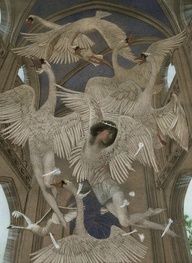
There were several factors included in this decision, although at the time it didn't really feel like a decision at all; it just felt like the only way things could or should be. It must have been one of the most basic things I 'knew' about The Swan Kingdom , before I even started work on it - that there would be four children in the doomed family rather than twelve or eight.
Why? Well firstly let's go back to 2004-2005 when I was planning and writing Wild Swans, as it was titled then. Harry Potter was at the zenith of its fame and success, so there was a real demand from publishers for exciting fiction aimed at 8-12 year olds, and as a result of the ever-expanding wordcount of JKR's books, those novels were starting to get a bit fatter even for regular, non-bestselling writers.
But I was writing YA, and at that point the category hadn't experienced any kind of similar boom. Twilight wasn't yet a sparkle in Smeyer's eye, and Suzanne Collins was still writing middle grade fiction herself. In fact, many publishers during this period saw YA novels from anyone other than established big names as problematic, a bit of a hard sell, and - having seen legendary YA author and personal icon Tamora Pierce dropped by UK Random House due to disappointing sales in GB - I was well aware of this. Debut YA novels didn't get any latitude in word count. They were generally expected to be somewhere in the region of 45,000 to 65,000 words long.
Now, a published author with a good relationship with their editor might be able to get around this a bit, but I was a complete newbie. I didn't have an agent and I didn't have any connections in the publishing industry. I knew that if I sent a query for a YA novel to any publisher, and mentioned a wordcount much over 65,000 words, I would just be asking to be rejected out of hand. So I was determined to bring the book in under that.
But at the same time, a huge part of my motivation in writing a re-telling of the fairytale was to thoroughly explore who these people really were. In fairytales you're told what people did and said, where they went, the great and terrible deeds they perform - but you're never told why. Why is the wicked stepmother so evil? Why is her husband the King so easily duped? Just who are these children, and how do they survive the suffering they go through in the story with their sanity intact? Where does the princess get her towering silent strength and determination to save her brothers? I wanted to take the fairytale stereotypes and turn them into PEOPLE. People with fully realised personalities and complex motivations. If I couldn't do that then I didn't want to write the book at all.
You can immediately see the conflict here. In a book of 65,000 words or less how could I possibly fully characterise eleven brothers - as individuals - rather than a homogenous mass of Brother? How could I possibly make each of these young men a human with unique, memorable traits? Especially since the fairy tale has these boys losing their human form practically at the beginning? There was no way! I couldn't do it now, with four published books under my belt, and I certainly couldn't do it then. So the number had to be reduced in some way.
Now, throughout all the years of my childhood I had this poster on my bedroom wall:
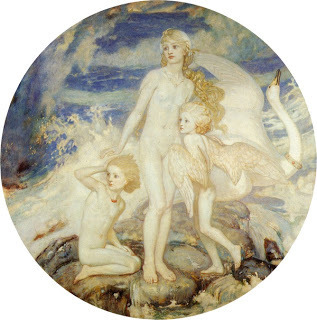
It's a piece of art called The Children of Lir and it's inspired by a Celtic Myth of the same name - a story in which a wicked stepmother transforms the children of her husband (the god Lugh) into swans and dooms them to spend hundreds of years living on each of Ireland's great lakes. It's a ridiculously beautiful painting, as you can see, and it's also a very vivid, striking image - of three brothers and one sister.
During the early planning stages of writing The Swan Kingdom , when I was still working out the setting and how the world and its magic would work, I saw a documentary on the BBC about pre-historic, pre-Roman civilisations in the UK, and I found it fascinating. Not much is known about the indigenous British people who created Stonehenge and Avebury and all the other great Paleolithic monuments of Great Britain, or why their beliefs caused them to sink such massive amounts of time and effort into building these temples of stone, into recreating the natural landscape in such a way. And when we don't know much? We can *invent*.
Something clicked in my head. The Celtic myth of The Children of Lir, the pre-historic people of Britain and their possessive reverence for their land which caused them to attempt to reshape it permanently, lost Celtic and ancient British beliefs, cave paintings that showed man and animal spirits melting together, traditions of oral storytelling passed down through the matriarchal line... all these things seemed to fit perfectly into the story I wanted to tell. And that made it feel natural and right to use the family structure from that Celtic myth, the structure of one sister and three brothers.
Chosing to give my heroine Alexandra three brothers - David, Hugh and Robin - whom she knew as well as knew herself, whom she relied on and was incredibly close to, was, in my opinion, one of the best decisions that I made in writing the story. It meant that each of them got to be a distinct person, special to Alexandra - and special to me! - in their own way.
Reliable, quiet, intelligent David, quicksilver, charming, funny Hugh, studious, sweet, kind Robin... they're the big brothers I wish were mine (I don't have an older brother - just a younger one, who isn't anything like any of the boys in the story). And hopefully when Alex loses them in The Swan Kingdom the reader is able to fully understand her anguish and her desperation to get them back - not as a Fairytale Princess With A Quest but as a sister who has lost all the family she loved and can never mend her broken heart until she is reunited with the brothers she adores.
I hope that answers your question Imaginatrix! If anyone else has any questions about my books, or writing, or anything else for that matter, just pop them in the comments and I'll do my best to answer them here in future posts. See you on Thursday, Dear Readers!

Today I'm answering a question about The Swan Kingdom from a young writer who asks to be referred to by her FanFiction handle, The Imaginatrix. She says:
What made you decide to reduce the number of brothers involved to three? One of the things I loved about "The Wild Swans" was the number of brothers...This is a really great question because it not only gives me the chance to offer you some information about my writing process, it also allows me to go back and dig into my own motivations, and quite often when I do that I discover stuff about the instinctive choices I've made that's very useful to me moving forward. *Airpunch*
So! The Imaginatrix is right. The number of siblings included in my version of 'The Wild Swans' is vastly reduced from either the eleven brothers you see in Hans Christian Andersen's tale or the seven that you sometimes see in other variations of it (for example, in the version where the brothers are ravens, rather than swans).

There were several factors included in this decision, although at the time it didn't really feel like a decision at all; it just felt like the only way things could or should be. It must have been one of the most basic things I 'knew' about The Swan Kingdom , before I even started work on it - that there would be four children in the doomed family rather than twelve or eight.
Why? Well firstly let's go back to 2004-2005 when I was planning and writing Wild Swans, as it was titled then. Harry Potter was at the zenith of its fame and success, so there was a real demand from publishers for exciting fiction aimed at 8-12 year olds, and as a result of the ever-expanding wordcount of JKR's books, those novels were starting to get a bit fatter even for regular, non-bestselling writers.
But I was writing YA, and at that point the category hadn't experienced any kind of similar boom. Twilight wasn't yet a sparkle in Smeyer's eye, and Suzanne Collins was still writing middle grade fiction herself. In fact, many publishers during this period saw YA novels from anyone other than established big names as problematic, a bit of a hard sell, and - having seen legendary YA author and personal icon Tamora Pierce dropped by UK Random House due to disappointing sales in GB - I was well aware of this. Debut YA novels didn't get any latitude in word count. They were generally expected to be somewhere in the region of 45,000 to 65,000 words long.
Now, a published author with a good relationship with their editor might be able to get around this a bit, but I was a complete newbie. I didn't have an agent and I didn't have any connections in the publishing industry. I knew that if I sent a query for a YA novel to any publisher, and mentioned a wordcount much over 65,000 words, I would just be asking to be rejected out of hand. So I was determined to bring the book in under that.
But at the same time, a huge part of my motivation in writing a re-telling of the fairytale was to thoroughly explore who these people really were. In fairytales you're told what people did and said, where they went, the great and terrible deeds they perform - but you're never told why. Why is the wicked stepmother so evil? Why is her husband the King so easily duped? Just who are these children, and how do they survive the suffering they go through in the story with their sanity intact? Where does the princess get her towering silent strength and determination to save her brothers? I wanted to take the fairytale stereotypes and turn them into PEOPLE. People with fully realised personalities and complex motivations. If I couldn't do that then I didn't want to write the book at all.
You can immediately see the conflict here. In a book of 65,000 words or less how could I possibly fully characterise eleven brothers - as individuals - rather than a homogenous mass of Brother? How could I possibly make each of these young men a human with unique, memorable traits? Especially since the fairy tale has these boys losing their human form practically at the beginning? There was no way! I couldn't do it now, with four published books under my belt, and I certainly couldn't do it then. So the number had to be reduced in some way.
Now, throughout all the years of my childhood I had this poster on my bedroom wall:

It's a piece of art called The Children of Lir and it's inspired by a Celtic Myth of the same name - a story in which a wicked stepmother transforms the children of her husband (the god Lugh) into swans and dooms them to spend hundreds of years living on each of Ireland's great lakes. It's a ridiculously beautiful painting, as you can see, and it's also a very vivid, striking image - of three brothers and one sister.
During the early planning stages of writing The Swan Kingdom , when I was still working out the setting and how the world and its magic would work, I saw a documentary on the BBC about pre-historic, pre-Roman civilisations in the UK, and I found it fascinating. Not much is known about the indigenous British people who created Stonehenge and Avebury and all the other great Paleolithic monuments of Great Britain, or why their beliefs caused them to sink such massive amounts of time and effort into building these temples of stone, into recreating the natural landscape in such a way. And when we don't know much? We can *invent*.
Something clicked in my head. The Celtic myth of The Children of Lir, the pre-historic people of Britain and their possessive reverence for their land which caused them to attempt to reshape it permanently, lost Celtic and ancient British beliefs, cave paintings that showed man and animal spirits melting together, traditions of oral storytelling passed down through the matriarchal line... all these things seemed to fit perfectly into the story I wanted to tell. And that made it feel natural and right to use the family structure from that Celtic myth, the structure of one sister and three brothers.
Chosing to give my heroine Alexandra three brothers - David, Hugh and Robin - whom she knew as well as knew herself, whom she relied on and was incredibly close to, was, in my opinion, one of the best decisions that I made in writing the story. It meant that each of them got to be a distinct person, special to Alexandra - and special to me! - in their own way.
Reliable, quiet, intelligent David, quicksilver, charming, funny Hugh, studious, sweet, kind Robin... they're the big brothers I wish were mine (I don't have an older brother - just a younger one, who isn't anything like any of the boys in the story). And hopefully when Alex loses them in The Swan Kingdom the reader is able to fully understand her anguish and her desperation to get them back - not as a Fairytale Princess With A Quest but as a sister who has lost all the family she loved and can never mend her broken heart until she is reunited with the brothers she adores.
I hope that answers your question Imaginatrix! If anyone else has any questions about my books, or writing, or anything else for that matter, just pop them in the comments and I'll do my best to answer them here in future posts. See you on Thursday, Dear Readers!
Published on September 04, 2012 00:48
August 30, 2012
RETROTHURSDAY: SOME THOUGHTS ON TWILIGHT
Hello, hello, hello, Dear Readers! It's RetroThursday, one of those random and unexpected posting days when I drag a mature, well-aged post, kicking and screaming, from the dark dankness of the archive where it had been quietly mouldering, into the light for your edification. Maybe you've never read this one before, or maybe you have but would be interested to refresh your memory. In either case, I present to you:
SOME THOUGHTS ON TWILIGHT
Firstly, I must admit that, yes, I *ought* to be writing right now. However, I've just realised that I have once again wandered down the forbidden Cul-De-Sac of Plot Digressions and found myself at the Dead End of Doom. Which means that in a few moments I am going to have to go back, find the point at which I began work today, highlight and delete. And that stings us, my precious, it stings us. So I'm going to delay the stinging just for a little while - just long enough to get these thoughts out.
I'm not going to summarise Twilight here. Chances are that even if you haven't read it, you know enough about the story to keep up. If not, and you still want to read on, go here first. But not if you're at work. Your boss may find your uncontrollable hoots of laughter suspicious.
I'm also not going to make any comments like 'lots of people loved it anyway' or 'these are just my opinions' because that's blindingly obvious. If you want to try and flame me because you're convinced Twilight is perfect, go ahead, although you should be aware that working in the publishing industry has made me pretty much flame retardant.
Romance is a tricky thing to write. I know - all my novels so far have a romantic element, and I find it one of the hardest things to get right because what you're trying to capture on the page is something that has been talked about, sung about, acted about since the beginning of time. Every description has already been used. Every phrase is already a cliche. When you're trying to convey a great, immortal love on paper, it's like trying to paint on a canvas that has already been painted on by every other painter that ever lived. No matter how good you are, all those layers of old paint are going to effect your colours and composition. They're going to shape what you paint. They're going to show through.
Even worse than that is the fact that in real life, love has a massive physical component. On film when Gwyneth Paltrow or Scarlett Johanssen walks into the room and the hero stares at her, drumstruck, we GET it. In writing, you can spend ten pages describing the beauty of your love interest without conveying the smallest part of that vital, obvious human connection.
Stephenie Meyer runs up against both these problems in Twilight. She spends on average one paragraph on every page of Twilight describing Edward's physical beauty. She's trying to create that impact - that blinding moment when you look at someone and fall a little in love with them instantly, just because of their eyes or the way they smile. Unfortunately, she does not succeed. To me, what happens instead is that I find her writing - and her main character's internal monologue - so incredibly tedious that I wish Edward had died of the influenza back at the turn of the century rather than inflict these endless lines about his butterscotch-ochre eyes, flawless sparkly skin, tousled bronze hair and perfect, crooked (how can it be both perfect AND crooked? Iunno) smile on the world.
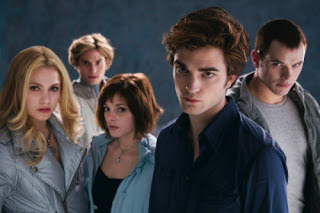
What's more, Bella does not find one single way of thinking or talking about Edward that is not already a cliche. Perhaps aware of this, the author tries to pretend that the colours showing through her work are there on purpose, by flinging literary references at us. Unfortunately, once again, it does not work. Instead, comparing her own prose to that of Austen, Bronte and Shakespeare only makes it all the more clear how remarkably and painfully average her writing is.
So what I'm saying is, Smeyer (as I like to abbreviate her name, just for efficiency's sake) isn't that great a writer. She falls into the two big romance traps. However, I could forgive her that. I've read many, many books with worse writing, and Smeyer's universe, descriptions and plot are at least internally consistent. My main problem with the Twilight books is that, once you've read them all and begin to compare them to other romantic books, a single fact begins to dawn on you.
The Twilight Saga is not actually romance.
Deep breaths now, people. Stay with me.
To illustrate my point, I'm going to talk to you about one of my favourite YA romance fantasies, which is Howl's Moving Castle by Diana Wynne Jones. Here, we have two characters who are (like the lovers in Twilight) separated by many factors. The main character, Sophie, is a shy, dutiful and self-effacing young woman who, through a misunderstanding, falls under a curse which gives her the apperance of an eighty year old woman. Following this, she becomes part of the household of the Wicked Wizard Howl, famed for eating young woman's hearts.
Actually, Howl isn't a cannibal. He's a vain, arrogant and cowardly young wizard who (unbeknownst to Sophie) is under a curse of his own. He seduces and abandons young women without a qualm, slithers out of any real work and, on one memorable occasion, fills his entire castle with green slime because he's having a bad hair day. Sophie (finally freed from the need to be 'respectable' by the fact that she's a crone rather than a young woman) meddles, argues, bickers and fights with Howl constantly, messing up all his plans, forcing him to do things he doesn't want to do. Her interference sets Howl's world upside down, but he does the same to her, turning out to be an entirely different person than his first appearance would suggest.
This doesn't sound romantic, does it?
BUT IT IS. By the end of the book, when these two finally risk their lives to save each other and declare their love, the reader is totally and utterly convinced that their love is a real, breathing thing between them. That they are perfect for each other, not because their relationship is or ever will be perfect, but because it isn't.
The reason why this romance is convincing is that Sophie and Howl are both fully realised people in their own right. They come together despite or even because of their differences, make a choice to be the most important thing to each other, to mesh their seperate lives into one life, despite possibly having to sacrifice other things which are are important to them. This holds true of every good romance any of us have ever read, from Pride and Prejudice through to The Sharing Knife books by Lois McMaster Bujold.
Now let's look at Bella. I mean, really look at her. Who is she?
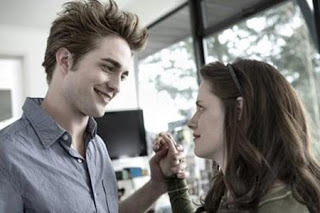
She's clumsy - but that's not a personality trait, anymore than having a mole on your cheek is a personality trait. She likes reading. Not much - she's not passionate about it or anything, but it's something she does. She doesn't like rain or cold. She is mildly fond of her parents, but has no respect for either of them, and no apparent need for or reliance on them. She cooks, but not out of any sense of enjoyment - just because she thinks she should. Aaand... that's it. Those are literally her only traits.
She has no ambitions. No dreams. No hopes or fears. She doesn't worry about college, plan to travel, intend to become a writer or an actress or a bank manager. She doesn't think puppies are cute or disgusting. She doesn't sing in the shower. She is completely self-reliant and has no true bond to any human being or human experience.
She comes to Forks not because she wants to but because (once again) she thinks she should. Despite what appears to be a borderline disassociative disorder on Bella's part, young people at her school try to get to know her, but she has no interest in or empathy for any of them. They bore her. She doesn't think any of them are attractive or worth her attention. Her only emotion when any boy approaches her is 'Eugh'.
Then Edward appears. By her own account, he is utterly, breathtakingly beautiful. And he's the only person in Forks who apparently doesn't like her and want to be friends with her immediately (apart from one girl, called Lauren, who is so minor a character that she doesn't count).
Considering all this, it's hardly surprising that Bella is willing to risk her life to be with Edward within a week of knowing him. That she can say to him, straight-faced, that she would rather die than have him leave her alone. It's because he's a) the only person who she has ever found attractive or interesting b) SHE HAS NOTHING ELSE IN HER LIFE. In sacrificing her humanity she's called on to give up nothing significant to her, nothing that she needs or cares about. She's not human in any real sense anyway.
Now Edward. He has spent his entire undead life believing he is damned and soulless, moping about being the only singleton in a 'family' made up of passionately devoted couples. He says he loves his family, but they seem to inspire more exasperation than affection in him. He plays the piano (although, again, he doesn't seem to be passionate about it). Other than that, his only occupation seems to have been going to High School over and over and over and over, feeling superior to every person he meets because he can read their minds. He's done a stint at medical school, but he's never attempted to be a practising doctor. To do that he'd need to take an interest in something other than his own misery, which he cannot apparently bring himself to do.
He's never had a relationship, even of the hand-holding variety, with anyone. What kind of a life is that? He might as well have died!
So of course *he's* willing to sacrifice his being for Bella. She is literally the only interesting thing that's happened to him since he turned into a vampire. He can't read her mind and she smells good enough that he actually wants to kill her, unlike every other girl he's ever met, who all put him off with their stinky perfume and bore him with their pointless internal monologue.
And even when these two link up, there's still not enough human life in the pair of them to make one real human being.
Bella and Edward never think of anything but each other, discuss anything but their feelings for each other, or have any thoughts about their future except for being together. They're perfect for each other because no one else could possibly establish or maintain a relationship with either of them. When you think of it like that, you realise what you're looking at in this book isn't a romance at all. It's about a co-dependent relationship of socially retarded loners who are both so isolated that they have no choice but to cling to each other and call it love.
Now, if you want to write a story about the suffocating and unhealthy relationship between a pair of sociopathic teens who are both unable to form any meaningful relationship with anyone other than each other...fine. But please don't gussy it up and pretend that it's the next Romeo and Juliet. The 'love' these two have for each isn't the 'love' that the rest of us experience in our lives. Neither of them appear to know what love is.
Love is accepting (as Bella and Edward never do) that the other person in the relationship is a PERSON. Flawed. Conflicted and contradictory. Stuffed with insecurities and anger and shame and sadness. And laughter and life and joy. Love is looking at another person, knowing that they are not and never will be your 'dream lover' and choosing to be with them anyway. Choosing to give up every fantasy you ever had about Mr Perfect swooping in and fixing your life, because that fantasy doesn't mean as much to you as the guy with the head-cold snoring on the sofa in front of Match of the Day.
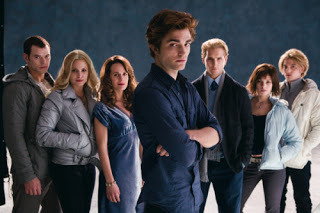
Love is being with someone not because they're imprinted on you or destined for you, or the only person in the whole world whose mind you can't read, or the only person who ever aroused you from your crippling apathy for five seconds, but because they're them. Joe, or Sally or Pilar or Hasif. Just that. Only that. That's what love is. And when we try to convey love on the page, whether or not we're successful, whether or not our depiction of that feeling is to everyone's taste, that is what we should be *trying* to achieve.
But Smeyer doesn't attempt that. She doesn't want that. Her stories give us two rather horrible people who are each convinced (justifiably) of their own inadequacy and equally convinced (without basis) of the other person's perfection. No matter how arrogant, patronising, controlling and hypocritical Edward is, Bella clings to the unshakeable conviction that he is without any flaws at all. She can't admit that he ever has or ever will do anything wrong or made a single error. She loves him only as a sparkly marble cupcake Adonis, not as a person. And no matter how mind-numbingly stupid, self-absorbed, over-dramatic and boring Bella is, Edward remains convinced that she is the perfect delicate flower of womanhood, without blemish, without stain. He loves her as a symbol of the shining, virginal girl he ought to have married if he had remained human - not as person with her own valid desires, dreams and doubts.
Twilight a love story? Not in a million years. And that's why, despite being amused by the lulz involved in the ridiculousness of the 'saga', and despite wanting girls to be able to read romances without feeling shame about it, deep down I kind of hate these books. Because they're supposed to be about love, but there's no heart in them. What they're really about is desperation and loneliness.
Oh, and sparkly stalker boys. Mustn't forget that.
SOME THOUGHTS ON TWILIGHT
Firstly, I must admit that, yes, I *ought* to be writing right now. However, I've just realised that I have once again wandered down the forbidden Cul-De-Sac of Plot Digressions and found myself at the Dead End of Doom. Which means that in a few moments I am going to have to go back, find the point at which I began work today, highlight and delete. And that stings us, my precious, it stings us. So I'm going to delay the stinging just for a little while - just long enough to get these thoughts out.
I'm not going to summarise Twilight here. Chances are that even if you haven't read it, you know enough about the story to keep up. If not, and you still want to read on, go here first. But not if you're at work. Your boss may find your uncontrollable hoots of laughter suspicious.
I'm also not going to make any comments like 'lots of people loved it anyway' or 'these are just my opinions' because that's blindingly obvious. If you want to try and flame me because you're convinced Twilight is perfect, go ahead, although you should be aware that working in the publishing industry has made me pretty much flame retardant.
Romance is a tricky thing to write. I know - all my novels so far have a romantic element, and I find it one of the hardest things to get right because what you're trying to capture on the page is something that has been talked about, sung about, acted about since the beginning of time. Every description has already been used. Every phrase is already a cliche. When you're trying to convey a great, immortal love on paper, it's like trying to paint on a canvas that has already been painted on by every other painter that ever lived. No matter how good you are, all those layers of old paint are going to effect your colours and composition. They're going to shape what you paint. They're going to show through.
Even worse than that is the fact that in real life, love has a massive physical component. On film when Gwyneth Paltrow or Scarlett Johanssen walks into the room and the hero stares at her, drumstruck, we GET it. In writing, you can spend ten pages describing the beauty of your love interest without conveying the smallest part of that vital, obvious human connection.
Stephenie Meyer runs up against both these problems in Twilight. She spends on average one paragraph on every page of Twilight describing Edward's physical beauty. She's trying to create that impact - that blinding moment when you look at someone and fall a little in love with them instantly, just because of their eyes or the way they smile. Unfortunately, she does not succeed. To me, what happens instead is that I find her writing - and her main character's internal monologue - so incredibly tedious that I wish Edward had died of the influenza back at the turn of the century rather than inflict these endless lines about his butterscotch-ochre eyes, flawless sparkly skin, tousled bronze hair and perfect, crooked (how can it be both perfect AND crooked? Iunno) smile on the world.

What's more, Bella does not find one single way of thinking or talking about Edward that is not already a cliche. Perhaps aware of this, the author tries to pretend that the colours showing through her work are there on purpose, by flinging literary references at us. Unfortunately, once again, it does not work. Instead, comparing her own prose to that of Austen, Bronte and Shakespeare only makes it all the more clear how remarkably and painfully average her writing is.
So what I'm saying is, Smeyer (as I like to abbreviate her name, just for efficiency's sake) isn't that great a writer. She falls into the two big romance traps. However, I could forgive her that. I've read many, many books with worse writing, and Smeyer's universe, descriptions and plot are at least internally consistent. My main problem with the Twilight books is that, once you've read them all and begin to compare them to other romantic books, a single fact begins to dawn on you.
The Twilight Saga is not actually romance.
Deep breaths now, people. Stay with me.
To illustrate my point, I'm going to talk to you about one of my favourite YA romance fantasies, which is Howl's Moving Castle by Diana Wynne Jones. Here, we have two characters who are (like the lovers in Twilight) separated by many factors. The main character, Sophie, is a shy, dutiful and self-effacing young woman who, through a misunderstanding, falls under a curse which gives her the apperance of an eighty year old woman. Following this, she becomes part of the household of the Wicked Wizard Howl, famed for eating young woman's hearts.
Actually, Howl isn't a cannibal. He's a vain, arrogant and cowardly young wizard who (unbeknownst to Sophie) is under a curse of his own. He seduces and abandons young women without a qualm, slithers out of any real work and, on one memorable occasion, fills his entire castle with green slime because he's having a bad hair day. Sophie (finally freed from the need to be 'respectable' by the fact that she's a crone rather than a young woman) meddles, argues, bickers and fights with Howl constantly, messing up all his plans, forcing him to do things he doesn't want to do. Her interference sets Howl's world upside down, but he does the same to her, turning out to be an entirely different person than his first appearance would suggest.
This doesn't sound romantic, does it?
BUT IT IS. By the end of the book, when these two finally risk their lives to save each other and declare their love, the reader is totally and utterly convinced that their love is a real, breathing thing between them. That they are perfect for each other, not because their relationship is or ever will be perfect, but because it isn't.
The reason why this romance is convincing is that Sophie and Howl are both fully realised people in their own right. They come together despite or even because of their differences, make a choice to be the most important thing to each other, to mesh their seperate lives into one life, despite possibly having to sacrifice other things which are are important to them. This holds true of every good romance any of us have ever read, from Pride and Prejudice through to The Sharing Knife books by Lois McMaster Bujold.
Now let's look at Bella. I mean, really look at her. Who is she?

She's clumsy - but that's not a personality trait, anymore than having a mole on your cheek is a personality trait. She likes reading. Not much - she's not passionate about it or anything, but it's something she does. She doesn't like rain or cold. She is mildly fond of her parents, but has no respect for either of them, and no apparent need for or reliance on them. She cooks, but not out of any sense of enjoyment - just because she thinks she should. Aaand... that's it. Those are literally her only traits.
She has no ambitions. No dreams. No hopes or fears. She doesn't worry about college, plan to travel, intend to become a writer or an actress or a bank manager. She doesn't think puppies are cute or disgusting. She doesn't sing in the shower. She is completely self-reliant and has no true bond to any human being or human experience.
She comes to Forks not because she wants to but because (once again) she thinks she should. Despite what appears to be a borderline disassociative disorder on Bella's part, young people at her school try to get to know her, but she has no interest in or empathy for any of them. They bore her. She doesn't think any of them are attractive or worth her attention. Her only emotion when any boy approaches her is 'Eugh'.
Then Edward appears. By her own account, he is utterly, breathtakingly beautiful. And he's the only person in Forks who apparently doesn't like her and want to be friends with her immediately (apart from one girl, called Lauren, who is so minor a character that she doesn't count).
Considering all this, it's hardly surprising that Bella is willing to risk her life to be with Edward within a week of knowing him. That she can say to him, straight-faced, that she would rather die than have him leave her alone. It's because he's a) the only person who she has ever found attractive or interesting b) SHE HAS NOTHING ELSE IN HER LIFE. In sacrificing her humanity she's called on to give up nothing significant to her, nothing that she needs or cares about. She's not human in any real sense anyway.
Now Edward. He has spent his entire undead life believing he is damned and soulless, moping about being the only singleton in a 'family' made up of passionately devoted couples. He says he loves his family, but they seem to inspire more exasperation than affection in him. He plays the piano (although, again, he doesn't seem to be passionate about it). Other than that, his only occupation seems to have been going to High School over and over and over and over, feeling superior to every person he meets because he can read their minds. He's done a stint at medical school, but he's never attempted to be a practising doctor. To do that he'd need to take an interest in something other than his own misery, which he cannot apparently bring himself to do.
He's never had a relationship, even of the hand-holding variety, with anyone. What kind of a life is that? He might as well have died!
So of course *he's* willing to sacrifice his being for Bella. She is literally the only interesting thing that's happened to him since he turned into a vampire. He can't read her mind and she smells good enough that he actually wants to kill her, unlike every other girl he's ever met, who all put him off with their stinky perfume and bore him with their pointless internal monologue.
And even when these two link up, there's still not enough human life in the pair of them to make one real human being.
Bella and Edward never think of anything but each other, discuss anything but their feelings for each other, or have any thoughts about their future except for being together. They're perfect for each other because no one else could possibly establish or maintain a relationship with either of them. When you think of it like that, you realise what you're looking at in this book isn't a romance at all. It's about a co-dependent relationship of socially retarded loners who are both so isolated that they have no choice but to cling to each other and call it love.
Now, if you want to write a story about the suffocating and unhealthy relationship between a pair of sociopathic teens who are both unable to form any meaningful relationship with anyone other than each other...fine. But please don't gussy it up and pretend that it's the next Romeo and Juliet. The 'love' these two have for each isn't the 'love' that the rest of us experience in our lives. Neither of them appear to know what love is.
Love is accepting (as Bella and Edward never do) that the other person in the relationship is a PERSON. Flawed. Conflicted and contradictory. Stuffed with insecurities and anger and shame and sadness. And laughter and life and joy. Love is looking at another person, knowing that they are not and never will be your 'dream lover' and choosing to be with them anyway. Choosing to give up every fantasy you ever had about Mr Perfect swooping in and fixing your life, because that fantasy doesn't mean as much to you as the guy with the head-cold snoring on the sofa in front of Match of the Day.

Love is being with someone not because they're imprinted on you or destined for you, or the only person in the whole world whose mind you can't read, or the only person who ever aroused you from your crippling apathy for five seconds, but because they're them. Joe, or Sally or Pilar or Hasif. Just that. Only that. That's what love is. And when we try to convey love on the page, whether or not we're successful, whether or not our depiction of that feeling is to everyone's taste, that is what we should be *trying* to achieve.
But Smeyer doesn't attempt that. She doesn't want that. Her stories give us two rather horrible people who are each convinced (justifiably) of their own inadequacy and equally convinced (without basis) of the other person's perfection. No matter how arrogant, patronising, controlling and hypocritical Edward is, Bella clings to the unshakeable conviction that he is without any flaws at all. She can't admit that he ever has or ever will do anything wrong or made a single error. She loves him only as a sparkly marble cupcake Adonis, not as a person. And no matter how mind-numbingly stupid, self-absorbed, over-dramatic and boring Bella is, Edward remains convinced that she is the perfect delicate flower of womanhood, without blemish, without stain. He loves her as a symbol of the shining, virginal girl he ought to have married if he had remained human - not as person with her own valid desires, dreams and doubts.
Twilight a love story? Not in a million years. And that's why, despite being amused by the lulz involved in the ridiculousness of the 'saga', and despite wanting girls to be able to read romances without feeling shame about it, deep down I kind of hate these books. Because they're supposed to be about love, but there's no heart in them. What they're really about is desperation and loneliness.
Oh, and sparkly stalker boys. Mustn't forget that.
Published on August 30, 2012 00:44
August 28, 2012
SHOULD 13YR OLDS READ 50 SHADES OF GREY?
Today's blog title is the name of the debate that I participated in on Monday on the Radio Four 'You and Yours' programme.
The BBC called Walker Books in the middle of last week, wanting to know if they had an author who would be willing to talk about the issue on air. The other participant in the discussion was to be Tara Benson from Harlequin Mills & Boon (who publish romances worldwide). The PR department at Walker thought of me - well-known as I am for liking to talk on pretty much every much subject - and with a bit of shuffling we managed to arrange everything.
So yesterday I got on a train and went to Lincoln, which was the closest town to me with a BBC studio available, and I was hooked up to a mic and broadcast throughout the country talking about YA novels and why I think that most people (young or old) would be better off readng pretty much anything than 50 Shades of Grey, because it's incredibly badly written, and tedious, and both the main characters are as wooden as the wall of a garden shed, AND it romanticizes a relationship which is extremely dangerous and unhealthy.
I think we had a really great discussion about it, with Tara Benson turning out to be a highly sensible and intelligent lady with lots of good stuff to say, and me managing to get my fifty-pence in as I had been determined I would. You can listen to the debate (and the whole show) through this link .
My bit starts about halfway through, if you want to zip ahead :) Let me know what you think in the comments!
The BBC called Walker Books in the middle of last week, wanting to know if they had an author who would be willing to talk about the issue on air. The other participant in the discussion was to be Tara Benson from Harlequin Mills & Boon (who publish romances worldwide). The PR department at Walker thought of me - well-known as I am for liking to talk on pretty much every much subject - and with a bit of shuffling we managed to arrange everything.
So yesterday I got on a train and went to Lincoln, which was the closest town to me with a BBC studio available, and I was hooked up to a mic and broadcast throughout the country talking about YA novels and why I think that most people (young or old) would be better off readng pretty much anything than 50 Shades of Grey, because it's incredibly badly written, and tedious, and both the main characters are as wooden as the wall of a garden shed, AND it romanticizes a relationship which is extremely dangerous and unhealthy.
I think we had a really great discussion about it, with Tara Benson turning out to be a highly sensible and intelligent lady with lots of good stuff to say, and me managing to get my fifty-pence in as I had been determined I would. You can listen to the debate (and the whole show) through this link .
My bit starts about halfway through, if you want to zip ahead :) Let me know what you think in the comments!
Published on August 28, 2012 01:20
August 23, 2012
I SUCK
Hello, Dear Readers! Thursday again and time for me to ramble on at you for a bit. Again, this is more like a series of random thoughts than a real essay, so apologies in advance.
Lately I've been thinking about the fact that I was published really young. Meeting Karen Mahoney and Lee Weatherly at the Foyles event made me realise how unusual it is for someone to get attention from a mainstream, respected publisher at the age of twenty-one with their very first completed YA novel, and to get a publishing contract at twenty-two with their second completed YA manuscript. I was incredibly lucky to have crossed the desk of my first editor, who encouraged me and offered me so much support, and incredibly lucky that he worked at Walker Books, who have a fine tradition of nurturing new talent and developing close relationships with their authors.
But it wasn't just luck. A lot of it was me; me wanting it so, so badly because the dream of being a published author felt like all I had. It was the only thing that would make everything I had gone through as a bullied outsider worthwhile, the only thing that would show everyone who'd ever picked on or mistreated me that I was a valid person, that they were wrong and I was right the whole time. The full force of my determination went into writing and trying to get published, and it left room for nothing else - not college, not looking for a satisfying job, not even much in the way of a social life. And that single-mindedness did pay off. Even though my first book (The Swan Kingdom) wasn't actually released until I was twenty-four, I had a publishing contract by the age of twenty-two. I had, I felt at the time, WON.
Here's a hint to my past self: You really haven't. Sorry.
I'm proud of The Swan Kingdom. In fact, I'm proud of all the books I've written, in different ways and for different reasons. Each story and each set of characters represents something important to me, challenges that I set for myself, whether I was entirely successful in meeting them or not.
But there's no escaping the fact that being published young - and having spent so much of my life up until that point focusing exclusively on writing - had a huge effect on the quality of my debut and my early work. I'm not like Veronica Roth or Sarah Rees Brennan or Rae Carson. My first book wasn't a storming, ground-breaking piece of fiction that astonished commentors could hardly believe was a debut. It was a quiet, sweet little story that a lot of people liked, but which didn't give much of a hint as to the stories I would be producing in the future.
My courage, my craft, my perspective on humans and their relationships, my awareness of diversity... these things have gotten better with each book I've published. And as a result, each book I've written has been just a bit better than the one before. I know this. I know it in my heart and I know it because everyone tells me so. It's one of the comments that I see all the time - on Goodreads or on review blogs. 'This author just keeps getting better and better'. When reviewers, your editor, even your mum agrees, you get the message. And I'm really happy this is the case.
But developing like this - in public, with every reader as a witness to your progress - is tough. Sometimes looking back at decisions made in previous books makes me cringe. When I see reviewers pointing out the same old problems with my earlier books that I've seen mentioned in a dozen reviews before, sometimes I want to crawl into a hole. How could I have let the book go out like that? Why didn't I see those problems at the time it went out? Am I going to have to regret that for the rest of my career? I'm not going to list all the flaws that I (and everyone) can see in my own work here, but suffice it to say that if I could write The Swan Kingdom and Daughter of the Flames all over again *now* they would be vastly different books.
In fact, they wouldn't be The Swan Kingdom and Daughter of the Flames at all.
Because I couldn't write The Swan Kingdom now. I couldn't write Daughter of the Flames. I'm a different person and a different writer. The books might have the same titles (or maybe not even that!) and be based on the same fairytale or original ideas, but they would not be the same books. Those characters and their choices would be, most probably, unrecognisable. The way I would write them would be unrecognisable.
Would I feel better about them right now if they were in that form? Most probably.
But what about in ten years time?
In ten years time maybe I'd be cringing over them in exactly the same way. Just because they'd be more acceptable to the current me, that doesn't mean that the me five or ten years from now wouldn't find loads of mistakes and flaws there. Just because I'm a better writer now, that doesn't mean I'm the best I'll ever be. What a horrible thought!
And what's more, if The Swan Kingdom - with all its many flaws - hadn't been written, and accepted, and come out when it did back in 2007, would I have ever have written Daughter of the Flames at all? Without the mistakes I made writing Daughter of the Flames (which haunted me, and haunt me still ) would I really have had the courage and maturity to write Shadows on the Moon, the book that ripped me to pieces and left me a totally different writer then I was before? Without the new confidence that came from writing Shadows on the Moon, would I have been able to produce FrostFire, the book which my editor (and my mum!) tells me is my best work to date?
No.
We all suck now in comparison to our future selves. Of course we do. I thought I was pretty hot stuff when I first managed to create a shortcut on my desktop without messing up, or the first time I successfully boiled dried pasta without it sticking to the bottom of the pan. Those achievements were vital at the time. I couldn't get anywhere until I'd managed them. They pushed me onto more ambitious next steps. But looking back NOW, of course they seem simple and small in comparison to making and maintaining my own website, or cooking a five course Christmas dinner for my family.
The trick is to realise that the mistakes you made in the past are equally small in comparison to the things you can achieve right now. That the mistakes you make now are small compared you what you will be able to do in the future.
So yes, I sucked in the past. I suck now. And I will suck in the future. But who cares? Because I also did amazing - really amazing! - things in the past too. I got published before I was twenty-five! And I'm doing exciting, challenging things now; I've only just turned thirty and I already have four books out! And I will carry on doing great things in the future. No matter what mistakes I've made and am making and will make.
No matter what.
Spending time regretting the past? Wishing things had been different? Asking 'What if'? Well, it might be irresistable. But the very best way to make sure that you don't spend your entire life looking back over your shoulder wishing the past had been different is to do the best you can - the most courageous, scary, strange and YOU that you can - right now. None of us will ever be flawless or produce anything flawless, and accepting that is the only way to keep moving forward.
I suck. You suck. Everyone sucks. And that is a wonderful thing.
Carry on.
Lately I've been thinking about the fact that I was published really young. Meeting Karen Mahoney and Lee Weatherly at the Foyles event made me realise how unusual it is for someone to get attention from a mainstream, respected publisher at the age of twenty-one with their very first completed YA novel, and to get a publishing contract at twenty-two with their second completed YA manuscript. I was incredibly lucky to have crossed the desk of my first editor, who encouraged me and offered me so much support, and incredibly lucky that he worked at Walker Books, who have a fine tradition of nurturing new talent and developing close relationships with their authors.
But it wasn't just luck. A lot of it was me; me wanting it so, so badly because the dream of being a published author felt like all I had. It was the only thing that would make everything I had gone through as a bullied outsider worthwhile, the only thing that would show everyone who'd ever picked on or mistreated me that I was a valid person, that they were wrong and I was right the whole time. The full force of my determination went into writing and trying to get published, and it left room for nothing else - not college, not looking for a satisfying job, not even much in the way of a social life. And that single-mindedness did pay off. Even though my first book (The Swan Kingdom) wasn't actually released until I was twenty-four, I had a publishing contract by the age of twenty-two. I had, I felt at the time, WON.
Here's a hint to my past self: You really haven't. Sorry.
I'm proud of The Swan Kingdom. In fact, I'm proud of all the books I've written, in different ways and for different reasons. Each story and each set of characters represents something important to me, challenges that I set for myself, whether I was entirely successful in meeting them or not.
But there's no escaping the fact that being published young - and having spent so much of my life up until that point focusing exclusively on writing - had a huge effect on the quality of my debut and my early work. I'm not like Veronica Roth or Sarah Rees Brennan or Rae Carson. My first book wasn't a storming, ground-breaking piece of fiction that astonished commentors could hardly believe was a debut. It was a quiet, sweet little story that a lot of people liked, but which didn't give much of a hint as to the stories I would be producing in the future.
My courage, my craft, my perspective on humans and their relationships, my awareness of diversity... these things have gotten better with each book I've published. And as a result, each book I've written has been just a bit better than the one before. I know this. I know it in my heart and I know it because everyone tells me so. It's one of the comments that I see all the time - on Goodreads or on review blogs. 'This author just keeps getting better and better'. When reviewers, your editor, even your mum agrees, you get the message. And I'm really happy this is the case.
But developing like this - in public, with every reader as a witness to your progress - is tough. Sometimes looking back at decisions made in previous books makes me cringe. When I see reviewers pointing out the same old problems with my earlier books that I've seen mentioned in a dozen reviews before, sometimes I want to crawl into a hole. How could I have let the book go out like that? Why didn't I see those problems at the time it went out? Am I going to have to regret that for the rest of my career? I'm not going to list all the flaws that I (and everyone) can see in my own work here, but suffice it to say that if I could write The Swan Kingdom and Daughter of the Flames all over again *now* they would be vastly different books.
In fact, they wouldn't be The Swan Kingdom and Daughter of the Flames at all.
Because I couldn't write The Swan Kingdom now. I couldn't write Daughter of the Flames. I'm a different person and a different writer. The books might have the same titles (or maybe not even that!) and be based on the same fairytale or original ideas, but they would not be the same books. Those characters and their choices would be, most probably, unrecognisable. The way I would write them would be unrecognisable.
Would I feel better about them right now if they were in that form? Most probably.
But what about in ten years time?
In ten years time maybe I'd be cringing over them in exactly the same way. Just because they'd be more acceptable to the current me, that doesn't mean that the me five or ten years from now wouldn't find loads of mistakes and flaws there. Just because I'm a better writer now, that doesn't mean I'm the best I'll ever be. What a horrible thought!
And what's more, if The Swan Kingdom - with all its many flaws - hadn't been written, and accepted, and come out when it did back in 2007, would I have ever have written Daughter of the Flames at all? Without the mistakes I made writing Daughter of the Flames (which haunted me, and haunt me still ) would I really have had the courage and maturity to write Shadows on the Moon, the book that ripped me to pieces and left me a totally different writer then I was before? Without the new confidence that came from writing Shadows on the Moon, would I have been able to produce FrostFire, the book which my editor (and my mum!) tells me is my best work to date?
No.
We all suck now in comparison to our future selves. Of course we do. I thought I was pretty hot stuff when I first managed to create a shortcut on my desktop without messing up, or the first time I successfully boiled dried pasta without it sticking to the bottom of the pan. Those achievements were vital at the time. I couldn't get anywhere until I'd managed them. They pushed me onto more ambitious next steps. But looking back NOW, of course they seem simple and small in comparison to making and maintaining my own website, or cooking a five course Christmas dinner for my family.
The trick is to realise that the mistakes you made in the past are equally small in comparison to the things you can achieve right now. That the mistakes you make now are small compared you what you will be able to do in the future.
So yes, I sucked in the past. I suck now. And I will suck in the future. But who cares? Because I also did amazing - really amazing! - things in the past too. I got published before I was twenty-five! And I'm doing exciting, challenging things now; I've only just turned thirty and I already have four books out! And I will carry on doing great things in the future. No matter what mistakes I've made and am making and will make.
No matter what.
Spending time regretting the past? Wishing things had been different? Asking 'What if'? Well, it might be irresistable. But the very best way to make sure that you don't spend your entire life looking back over your shoulder wishing the past had been different is to do the best you can - the most courageous, scary, strange and YOU that you can - right now. None of us will ever be flawless or produce anything flawless, and accepting that is the only way to keep moving forward.
I suck. You suck. Everyone sucks. And that is a wonderful thing.
Carry on.
Published on August 23, 2012 01:09
August 22, 2012
CITY OF BONES EXCITEMENT
Hello, hello, hello, Dear Readers! A thousand apologies for skipping out on you yesterday - there was a problem with my dad's treatment and we ended up having to call in one of the specialist district nurses who manages dialysis. By the time she was able to get to us, and sort us out, and my dad's dialysis was finished, it was afternoon already and I just needed to read some Jane Austen and fall into a temporary coma (which I duly did).
But in the end it turned out for the best, because one of the things that I wanted to talk about was the emergence of set photos from the shooting of the City of Bones movie that's literally just started filming in Toronto. And overnight (different timezones and all) even more fantastic images have become available, so now I have more to talk about.
You guys already know that I am a huge Cassie Clare fan ( remember my interview with her, here? ) and that I've read all her books. But what I might not have mentioned before is that I have a complete fascination with movie adaptions of books. I'm borderline obsessed. I find the process by which books are adapted into a visual medium so interesting that I will buy DVDs of movies that I'm not even interested in seeing (like, for instance, Twilight: New Moon and Twilight: Eclipse) so that I can watch the DVD special features. I'm not interested in the screen-writing so much as the development of literary characters into movie ones - their costumes, make-up, hair - and settings - building soundstages, scouting locations - and tone - cinematography, score. Basically, I'm a big old geek about it.
Obviously this means that when films based on books I really love come out, I go into Ultra-Squee-Mode. I freaked out over the LotR films and the Harry Potter films, and now I am freaking out over City of Bones even more because we're getting all these sneak peeks of a kind we never did on other other, hush hush, closed set type films.
So I'm not going to repost all the pictures here because that would be a huuuge post; there are far too many. But what want to do - because I haven't really seen much of it online - is to look at some of the images and dissect what is going on and why I'm so thrilled. All of these pictures come from this amazing site called TMI Source and there are literally DOZENS of photos there, so if you're interested at all (and if you've made it this far into this post you probably are) head over there and have a look.
First, the picture that started the Ultra-Squee fire burning in my breast - the very first image of Jamie Campbell-Bowers as Jace.
 There have been so many doubts expressed about whether JCB was big enough, masculine enough, handsome enough (etc. etc.) to play Jace, and I'm sure some people will continue to b*tch right to their graves that Alex Pettyfer didn't get the role (even though he had the chance and actually turned it down and also doesn't look anything like a teenager anymore).
There have been so many doubts expressed about whether JCB was big enough, masculine enough, handsome enough (etc. etc.) to play Jace, and I'm sure some people will continue to b*tch right to their graves that Alex Pettyfer didn't get the role (even though he had the chance and actually turned it down and also doesn't look anything like a teenager anymore).
But this image set my doubts completely at rest because, no, JCB doesn't look like a huge muscle-bound hulk but what he does look like? Is a fighter. And I know fighters - I can tell them at a glance because for many years those are the guys I avoided like the plague. He's lithe, he's tough, and he's got a look that says 'Mess with me if you want. It's your funeral. Literally'. I love it. I admit that I had a slightly different idea in my head of Shadowhunter Gear; I got the impression that it was more formal, almost like a uniform. But heck, it's black and form-fitting and it definitely looks like something you could do a roundhouse kick in without splitting your seams. I also love the Morgenstern ring there on his finger. Seraph blades = also FTW.
But look! What's that going on behind Jamie? Two women both ALSO leatherclad and with the look of badasses??? Can we see more?
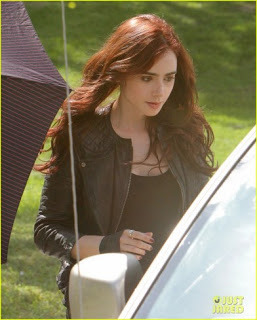
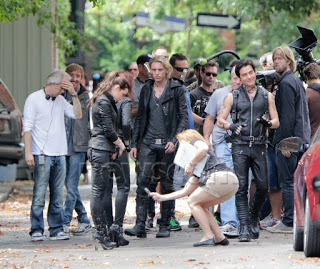
Clary and Isabelle and Alec! Whaaa! The first image shows us Clary's gorgeous red hair, and I'm so delighted because all the images of Lily Collins until now - even after she arrived in Canada for pre-production - have shown really dark tresses, almost black. I was a little worried that they'd buy into this trend of brunette heroines (ala Twilight, The Vampire Diaries, The Hunger Games) and try to fob us off with a few auburn highlights. But I needn't have been concerned. They have kept the tone fairly dark, but added the most beautiful vivid red shade over the top. It suits her really well and I adore the contrast with her pale skin. It's *so* Clary Fray.
Then under that we've got Isabelle, who is one of my favourite characters, in a sleek, long ponytail and huge heels (so true to character) and Alec, looking extremely buff. I think the fact that his Shadowhunting gear is sleeve-less is a bit... I don't know, it seems like they're distinguishing him very strongly from Jace here and giving him a slightly S&M look with the gloves. I'm not entirely sure that's true to the book, since Alec is very introverted and doesn't strike me as the type to chose a bicep-flashing outfit. Alec is also gay, and this is the sort of look you *might* see in a guy who was heading out to a gay club; my problem is that Alec is also closeted and terrified of anyone finding out about his sexuality. So it's a bit incongruous. But I'm willing to withhold judgement for now.
If you look behind those two, you get a tell-tale flash of red hair which makes you realise that Clary is still with them - and wearing an extremely UN-CLARY sort of outfit, with more huge heels and what look like the tightest black trousers EVER. What's going on there?
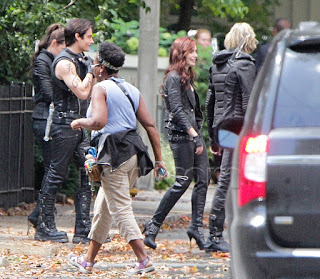
Well, apparently this scene was one where all the Shadowhunters (and Clary) march down the street together and head up to the building that they're using for Clary and Jocelyn's house. A boy (described as 'geeky') bumps into Clary and says 'Wow, Clary you look - uh - different...' Which means that this is the scene where Clary borrows clothes from Isabelle before heading out from the Institute with the gang to see Madame Dorothea at her house. And knowing that? I find this delicious. Because in the book Clary hates having to borrow Isabelle's clothes and feels stupid and awkward in them - but here we, seeing her from the outside, can clearly see that she looks amazing and like a true Shadowhunter (which we suspected from the text). I love it!
But let's reassure ourselves that Clary doesn't start out as a badass in this film. Here's a shot of her on what seems to be a little Juliet balcony, again at the building being used as her house:
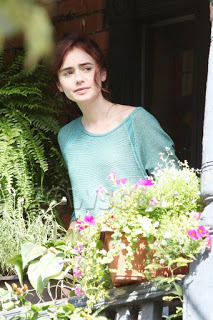
Adorable, and just right. A couple more shots of Clary au natural:
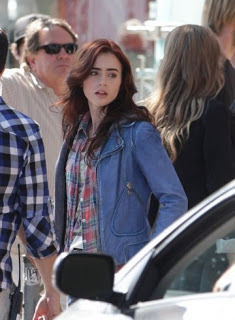
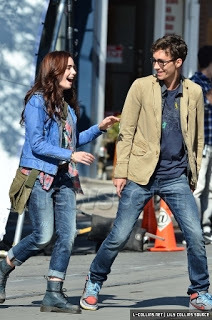
It's everyone's favourite Simon! Robert Sheehan here not only looks supernaturally like everyone's vision of Simon (I mean, whoa) but supernaturally like Josh, Cassie's real life husband. Seriously, I think Josh was even wearing that exact jacket when we met. What you can also see here is the brilliant casting at work because doesn't the chemistry between these two just blaze right off the pixels? Squee!
Next some really great action shots.
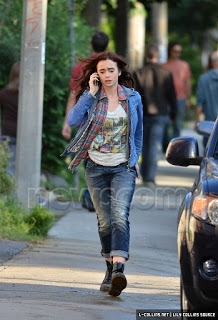
Clary on the phone, rushing down the street with an anxious look on her face. I'm pretty sure this must be the scene where Jocelyn phones her and tells her to stay away from the house, then Clary hears the start of the attack. This made me blink a tiny bit because if I remember rightly, in the book that happens at night and Clary's in club clothes. But it's possible that a) they're going to desaturate the footage to make it look like night and these ARE Clary's clubbing clothes or b) they've rejigged things and the scene doesn't play out that way anymore, which is probably more likely. It's just a little weird to adjust my mental image of that scene, which I always imagined dark and moody, to this sunlit, bright one.
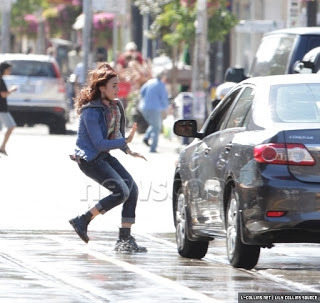
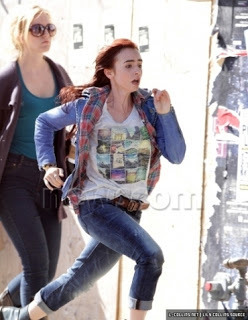
Clary running like Hell, trying to get home and help her mum. *Sniff* Poor Clary! You can see the rain puddles splashing up under her feet there in the road - according to set reports, the production team are constantly using hoses to create those, since it's clearly a warm and dry summer there in Toronto and of course the book is set in rainy autumn in New York.
I can't wait to see some more photos from the shoot. I'm honestly so excited for this film; it's going to be a really hard wait until this time next year when it's scheduled to release, but these pictures ease the pain a little.
In other news, the team behind the brilliant UKYA Blog had a big old meet up with loads of readers and bloggers and writers on Monday (lucky!) and they revealed the Top 100 UKYA Books as voted for by visitors to their site. My lovely friend Laura ( SisterSpooky ) was there, and sent me this:
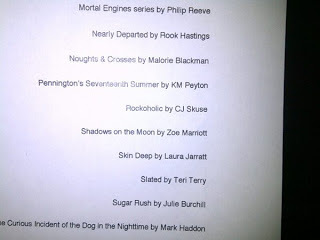
Shadows on the Moon made it into the Top 100! Right there next to Philip Reeve, Mark Haddon and Malorie Blackman! So thrilling! Thanks so much to everyone that voted, and especially to Susie and Keris and Keren the other brilliant authors who run UKYA .
Well, that's it from me today. Let me know how you're doing in the comments, my lovelies :)

But in the end it turned out for the best, because one of the things that I wanted to talk about was the emergence of set photos from the shooting of the City of Bones movie that's literally just started filming in Toronto. And overnight (different timezones and all) even more fantastic images have become available, so now I have more to talk about.
You guys already know that I am a huge Cassie Clare fan ( remember my interview with her, here? ) and that I've read all her books. But what I might not have mentioned before is that I have a complete fascination with movie adaptions of books. I'm borderline obsessed. I find the process by which books are adapted into a visual medium so interesting that I will buy DVDs of movies that I'm not even interested in seeing (like, for instance, Twilight: New Moon and Twilight: Eclipse) so that I can watch the DVD special features. I'm not interested in the screen-writing so much as the development of literary characters into movie ones - their costumes, make-up, hair - and settings - building soundstages, scouting locations - and tone - cinematography, score. Basically, I'm a big old geek about it.
Obviously this means that when films based on books I really love come out, I go into Ultra-Squee-Mode. I freaked out over the LotR films and the Harry Potter films, and now I am freaking out over City of Bones even more because we're getting all these sneak peeks of a kind we never did on other other, hush hush, closed set type films.
So I'm not going to repost all the pictures here because that would be a huuuge post; there are far too many. But what want to do - because I haven't really seen much of it online - is to look at some of the images and dissect what is going on and why I'm so thrilled. All of these pictures come from this amazing site called TMI Source and there are literally DOZENS of photos there, so if you're interested at all (and if you've made it this far into this post you probably are) head over there and have a look.
First, the picture that started the Ultra-Squee fire burning in my breast - the very first image of Jamie Campbell-Bowers as Jace.
 There have been so many doubts expressed about whether JCB was big enough, masculine enough, handsome enough (etc. etc.) to play Jace, and I'm sure some people will continue to b*tch right to their graves that Alex Pettyfer didn't get the role (even though he had the chance and actually turned it down and also doesn't look anything like a teenager anymore).
There have been so many doubts expressed about whether JCB was big enough, masculine enough, handsome enough (etc. etc.) to play Jace, and I'm sure some people will continue to b*tch right to their graves that Alex Pettyfer didn't get the role (even though he had the chance and actually turned it down and also doesn't look anything like a teenager anymore).But this image set my doubts completely at rest because, no, JCB doesn't look like a huge muscle-bound hulk but what he does look like? Is a fighter. And I know fighters - I can tell them at a glance because for many years those are the guys I avoided like the plague. He's lithe, he's tough, and he's got a look that says 'Mess with me if you want. It's your funeral. Literally'. I love it. I admit that I had a slightly different idea in my head of Shadowhunter Gear; I got the impression that it was more formal, almost like a uniform. But heck, it's black and form-fitting and it definitely looks like something you could do a roundhouse kick in without splitting your seams. I also love the Morgenstern ring there on his finger. Seraph blades = also FTW.
But look! What's that going on behind Jamie? Two women both ALSO leatherclad and with the look of badasses??? Can we see more?


Clary and Isabelle and Alec! Whaaa! The first image shows us Clary's gorgeous red hair, and I'm so delighted because all the images of Lily Collins until now - even after she arrived in Canada for pre-production - have shown really dark tresses, almost black. I was a little worried that they'd buy into this trend of brunette heroines (ala Twilight, The Vampire Diaries, The Hunger Games) and try to fob us off with a few auburn highlights. But I needn't have been concerned. They have kept the tone fairly dark, but added the most beautiful vivid red shade over the top. It suits her really well and I adore the contrast with her pale skin. It's *so* Clary Fray.
Then under that we've got Isabelle, who is one of my favourite characters, in a sleek, long ponytail and huge heels (so true to character) and Alec, looking extremely buff. I think the fact that his Shadowhunting gear is sleeve-less is a bit... I don't know, it seems like they're distinguishing him very strongly from Jace here and giving him a slightly S&M look with the gloves. I'm not entirely sure that's true to the book, since Alec is very introverted and doesn't strike me as the type to chose a bicep-flashing outfit. Alec is also gay, and this is the sort of look you *might* see in a guy who was heading out to a gay club; my problem is that Alec is also closeted and terrified of anyone finding out about his sexuality. So it's a bit incongruous. But I'm willing to withhold judgement for now.
If you look behind those two, you get a tell-tale flash of red hair which makes you realise that Clary is still with them - and wearing an extremely UN-CLARY sort of outfit, with more huge heels and what look like the tightest black trousers EVER. What's going on there?

Well, apparently this scene was one where all the Shadowhunters (and Clary) march down the street together and head up to the building that they're using for Clary and Jocelyn's house. A boy (described as 'geeky') bumps into Clary and says 'Wow, Clary you look - uh - different...' Which means that this is the scene where Clary borrows clothes from Isabelle before heading out from the Institute with the gang to see Madame Dorothea at her house. And knowing that? I find this delicious. Because in the book Clary hates having to borrow Isabelle's clothes and feels stupid and awkward in them - but here we, seeing her from the outside, can clearly see that she looks amazing and like a true Shadowhunter (which we suspected from the text). I love it!
But let's reassure ourselves that Clary doesn't start out as a badass in this film. Here's a shot of her on what seems to be a little Juliet balcony, again at the building being used as her house:

Adorable, and just right. A couple more shots of Clary au natural:


It's everyone's favourite Simon! Robert Sheehan here not only looks supernaturally like everyone's vision of Simon (I mean, whoa) but supernaturally like Josh, Cassie's real life husband. Seriously, I think Josh was even wearing that exact jacket when we met. What you can also see here is the brilliant casting at work because doesn't the chemistry between these two just blaze right off the pixels? Squee!
Next some really great action shots.

Clary on the phone, rushing down the street with an anxious look on her face. I'm pretty sure this must be the scene where Jocelyn phones her and tells her to stay away from the house, then Clary hears the start of the attack. This made me blink a tiny bit because if I remember rightly, in the book that happens at night and Clary's in club clothes. But it's possible that a) they're going to desaturate the footage to make it look like night and these ARE Clary's clubbing clothes or b) they've rejigged things and the scene doesn't play out that way anymore, which is probably more likely. It's just a little weird to adjust my mental image of that scene, which I always imagined dark and moody, to this sunlit, bright one.


Clary running like Hell, trying to get home and help her mum. *Sniff* Poor Clary! You can see the rain puddles splashing up under her feet there in the road - according to set reports, the production team are constantly using hoses to create those, since it's clearly a warm and dry summer there in Toronto and of course the book is set in rainy autumn in New York.
I can't wait to see some more photos from the shoot. I'm honestly so excited for this film; it's going to be a really hard wait until this time next year when it's scheduled to release, but these pictures ease the pain a little.
In other news, the team behind the brilliant UKYA Blog had a big old meet up with loads of readers and bloggers and writers on Monday (lucky!) and they revealed the Top 100 UKYA Books as voted for by visitors to their site. My lovely friend Laura ( SisterSpooky ) was there, and sent me this:

Shadows on the Moon made it into the Top 100! Right there next to Philip Reeve, Mark Haddon and Malorie Blackman! So thrilling! Thanks so much to everyone that voted, and especially to Susie and Keris and Keren the other brilliant authors who run UKYA .
Well, that's it from me today. Let me know how you're doing in the comments, my lovelies :)
Published on August 22, 2012 01:39
August 21, 2012
THE SUN'LL COME OUT TOMORROW
Hi Dear Readers! Due to unforeseen circumstances, I'm not going to be able to blog today. Hopefully I'll be able to write today's planned post for you tomorrow. Tune in then - same bat-time, same bat-channel. In the meantime, have a great Tuesday.
Zxxx
Zxxx
Published on August 21, 2012 01:39
August 16, 2012
FOREIGN EDITION LOVE AND KATANA UPDATES
Hi everyone - and happy Thursday to all! I hope you're having an excellent week so far, because I certainly am.
You might recall that back in March I told you about the Polish edition of Shadows on the Moon and shared the cover, which I had gotten off a European book website. I absolutely loved the cover artwork and was very excited about it. Since the release in April, I've had a lot of Google Alerts for Polish sites talking about and reviewing the foreign edition, which intrigued me even more (although the quality of Google's 'translate' function made it pretty impossible to tell what anyone was really saying).
But while it was in my contract that I should get some copies of any foreign language versions of my books, none arrived. So a little while ago I asked Lovely Lass about it, and this week she came through. I got the parcel containing the Polish books on Tuesday... and I am in love.
This is honestly the most beautiful incarnation that any of my books has ever had. It is the kind of book that I, as a book addict, would probably end up buying from the shop even if I had no interest in the contents, because it's simply THAT gorgeous.
Let me try to convey this with some images.
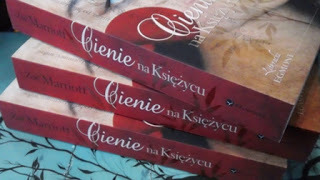
Look at the beautiful lettering on that spine. It's been treated with Spot UV, so it's glossy and shiny, and I love the way it seems to spill over from the spine onto the front cover. I also adore the way the red starts out vivid and bright around my name and shades gradually darker and bloodier toward the other end.
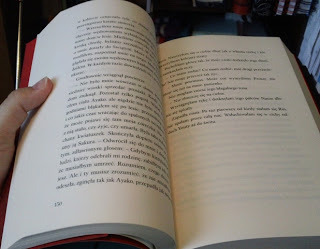
The covers and the page paper are both that luxurious, extra heavy stock which sort of flops open and stays there. You can bend the whole book practically in half. And it's not standard paperback size, either, but what I would call 'trade paperback', which means it has the same proportions as a hardback (I'm not sure if that's standard in Poland, but it's unusual in the UK).

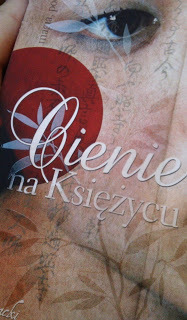 The outside of the cover has been treated it give it the most amazing, velvety texture. I've only come across this texture on books a couple of times before - normally on high profile, front-list titles. In addition, the bamboo leaf decoration is also picked out with Spot UV, and the ultra-glossy effect creates the most gorgeous contrast with the matt, suede-feel cover.
The outside of the cover has been treated it give it the most amazing, velvety texture. I've only come across this texture on books a couple of times before - normally on high profile, front-list titles. In addition, the bamboo leaf decoration is also picked out with Spot UV, and the ultra-glossy effect creates the most gorgeous contrast with the matt, suede-feel cover.
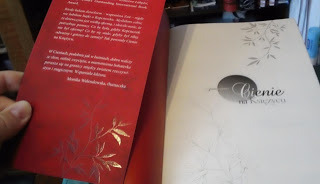
The gloss continues INSIDE the book, on both the front and back flaps. Oh, and that's another thing: French flaps! These are one of my absolute favourite things to find on a paperback. I adore them; a book with French flaps is almost irresistable to me. I never thought that a book of mine would get them because, again, they're normally saved for Mega Big Deal Titles.
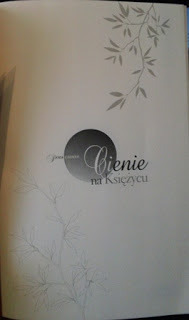
The bamboo silhouette continues onto the title page, both filled in and in outline, which again has the most beautiful subtlety to it. This decoration is on each of the section headers too.
Frankly, if every book that I ever write were to look exactly like this? I would be deliriously happy. I made the silly mistake of letting my mother see these, and she pounced and demanded one for herself but the other two are MINE ALL MINE and I shall be snuggling them forever more. *Sigh*
Now for another piece of news. Big Secret Project, aka my first ever urban fantasy story and my first ever trilogy, aka THE KATANA TRILOGY? Is going to be getting a new series title. It turns out that the word Katana has been copyrighted (or possibly trademarked? When I Googled it, it turned up a kind of golf club, so... iunno?) which means it's really awkward for Walker Books to publish a series with that name.
For about eight hours after Wonder Editor called me up to tell me this, I was a little bit flustered. I sent her a very long list of all kinds of other possible titles - many of which I liked, but none of which I really loved - and she went away to ponder them, and I went away to nibble on pencils and worry about it.
However, late that night as I was discussing it with a member of my writing group I suddenly had a brainwave and came up with what I personally thought was the perfect title for the trilogy. So I sent it off in an email and now I'm waiting for Wonder Editor's approval. But I'm not worried anymore, because it feels so right to me that I'm convinced the golf club people actually did me a favour.
And that has been my week so far! What about you guys? Tell me in the comments!
You might recall that back in March I told you about the Polish edition of Shadows on the Moon and shared the cover, which I had gotten off a European book website. I absolutely loved the cover artwork and was very excited about it. Since the release in April, I've had a lot of Google Alerts for Polish sites talking about and reviewing the foreign edition, which intrigued me even more (although the quality of Google's 'translate' function made it pretty impossible to tell what anyone was really saying).
But while it was in my contract that I should get some copies of any foreign language versions of my books, none arrived. So a little while ago I asked Lovely Lass about it, and this week she came through. I got the parcel containing the Polish books on Tuesday... and I am in love.
This is honestly the most beautiful incarnation that any of my books has ever had. It is the kind of book that I, as a book addict, would probably end up buying from the shop even if I had no interest in the contents, because it's simply THAT gorgeous.
Let me try to convey this with some images.

Look at the beautiful lettering on that spine. It's been treated with Spot UV, so it's glossy and shiny, and I love the way it seems to spill over from the spine onto the front cover. I also adore the way the red starts out vivid and bright around my name and shades gradually darker and bloodier toward the other end.

The covers and the page paper are both that luxurious, extra heavy stock which sort of flops open and stays there. You can bend the whole book practically in half. And it's not standard paperback size, either, but what I would call 'trade paperback', which means it has the same proportions as a hardback (I'm not sure if that's standard in Poland, but it's unusual in the UK).

 The outside of the cover has been treated it give it the most amazing, velvety texture. I've only come across this texture on books a couple of times before - normally on high profile, front-list titles. In addition, the bamboo leaf decoration is also picked out with Spot UV, and the ultra-glossy effect creates the most gorgeous contrast with the matt, suede-feel cover.
The outside of the cover has been treated it give it the most amazing, velvety texture. I've only come across this texture on books a couple of times before - normally on high profile, front-list titles. In addition, the bamboo leaf decoration is also picked out with Spot UV, and the ultra-glossy effect creates the most gorgeous contrast with the matt, suede-feel cover. 
The gloss continues INSIDE the book, on both the front and back flaps. Oh, and that's another thing: French flaps! These are one of my absolute favourite things to find on a paperback. I adore them; a book with French flaps is almost irresistable to me. I never thought that a book of mine would get them because, again, they're normally saved for Mega Big Deal Titles.

The bamboo silhouette continues onto the title page, both filled in and in outline, which again has the most beautiful subtlety to it. This decoration is on each of the section headers too.
Frankly, if every book that I ever write were to look exactly like this? I would be deliriously happy. I made the silly mistake of letting my mother see these, and she pounced and demanded one for herself but the other two are MINE ALL MINE and I shall be snuggling them forever more. *Sigh*
Now for another piece of news. Big Secret Project, aka my first ever urban fantasy story and my first ever trilogy, aka THE KATANA TRILOGY? Is going to be getting a new series title. It turns out that the word Katana has been copyrighted (or possibly trademarked? When I Googled it, it turned up a kind of golf club, so... iunno?) which means it's really awkward for Walker Books to publish a series with that name.
For about eight hours after Wonder Editor called me up to tell me this, I was a little bit flustered. I sent her a very long list of all kinds of other possible titles - many of which I liked, but none of which I really loved - and she went away to ponder them, and I went away to nibble on pencils and worry about it.
However, late that night as I was discussing it with a member of my writing group I suddenly had a brainwave and came up with what I personally thought was the perfect title for the trilogy. So I sent it off in an email and now I'm waiting for Wonder Editor's approval. But I'm not worried anymore, because it feels so right to me that I'm convinced the golf club people actually did me a favour.
And that has been my week so far! What about you guys? Tell me in the comments!
Published on August 16, 2012 01:01



